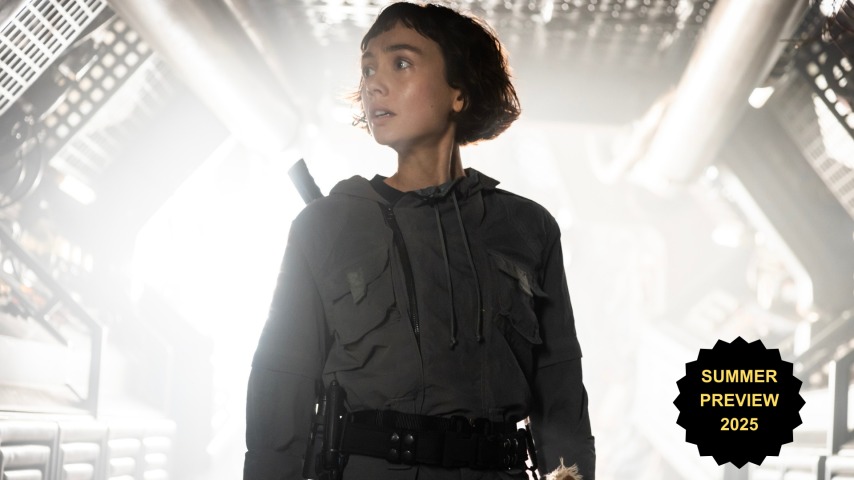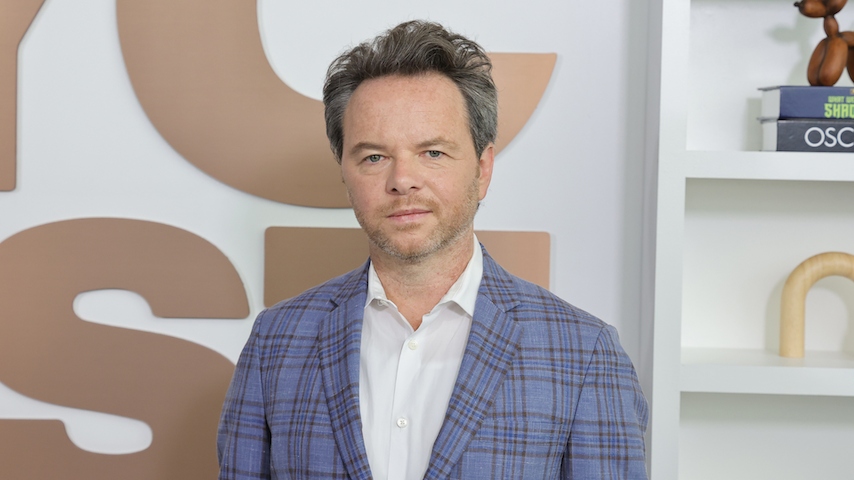Noah Hawley wants Alien: Earth to feel like watching the original movie for the first time
The creator of FX's sci-fi thriller talks corporate greed, fan service vs. art, and balancing scares and drama.
Photo: FX
Alien underlines its spooky atmospherics right from the jump: In the 1979 film’s opening scene, a commercial vessel floats in vast, dark space, and an eerie silence is cut by the sounds of whirring machines, flickering lights, and ominous background music. In doing so, director Ridley Scott set the tone for not just this sci-fi horror-thriller but the long-running movie franchise it would spawn. Soon, the saga will make its way to TV, where Fargo creator Noah Hawley once again spins a big-screen property into an episodic tale (and with a similarly enviable cast to boot).
Hawley’s primary goal with Alien: Earth, as he tells The A.V. Club, is to evoke the feeling of first watching the original film in the theaters decades ago, as the Nostromo‘s crew fight for their lives after coming in contact with a dangerous species. But what happens when the Xenomorphs descend on the green planet, where they can attack millions against the backdrop of lush forests and burgeoning industrial cities? Is that when we find out humans, with their corporate greed, have been the real monsters all along?
That’s the question the FX drama Alien: Earth will attempt to unpack when it kicks off August 12. The show’s premiere brings us to Earth in 2120, two years before the events of Scott’s movie. There are five conglomerates that rule the globe: Prodigy, Lynch, Dynamic, Threshold, and, of course, Weyland-Yutani. While synths and Cyborgs are thriving, Prodigy’s CEO develops a hybrid, a synthetic robot with human consciousness. This prototype is Wendy (Sydney Chandler), who becomes the audience’s gateway into Alien: Earth‘s terrors.
The A.V. Club spoke to Hawley about figuring out Alien: Earth‘s unique voice, assembling its cast, and not setting out “to be someone who reinvents classic movies as television shows.”
The A.V. Club: What was compelling about setting the series before the events of Alien? Were you worried about how you’d tie it to the film?
Noah Hawley: Yeah, after seven Alien movies now, it’s kind of a busy highway on some level, timeline-wise. It felt like the way to give myself the most leeway as a storyteller was to take myself out of the traffic and put myself in a standalone place in which I could explore the mythology of Earth and humanity in this franchise. That aspect has been underserved in the films, with questions like “What’s the government on Earth like?” and “Do we get along or have we solved our problems?” We know various corporations have succeeded, but that standalone spot allowed me to tell my story.
AVC: Speaking of, how much of the show will be about these five companies that have taken over the planet versus the gory Xenomorph stuff?
NH: My take on it is the same as when I did Legion. In that case, if you take the superpowers out of it, what’s the show? For this one, if we take the creatures out of Alien: Earth, is it a show? Is it a drama? Are there characters you’re invested in? If you build a great drama, and then add the monsters into it, now you’ve elevated it. If all you have is monsters, you’d better have 400 minutes of the most exciting creature stories ever told. But if it works dramatically, the creatures can be a tool in exploring the larger themes of the show as well as adding horror, action, and all those elements.

Noah Hawley (Photo: Kevin Winter/Getty Images)
AVC: Why is Sydney Chandler’s Wendy, who has human consciousness in her synthetic body, the essential lens for this story?
NH: On some level, science fiction has one main question. And that question is whether humanity deserves to survive—in all these stories of the first contact or going out into the universe and meeting species that are either smarter than us or more deadly than us. The issue for me then became to explore humanity at its best and its worst. Sydney’s character is humanity at its best, most innocent yet bravest in many ways. Wendy is someone who holds other humans to account for lying, cheating, stealing, bad behavior, manipulating each other, trying to own other people—all those sorts of things.
Too often in this world, we’re told that life is too complicated to make simple choices. But it’s either good or bad at the end of the day. We either deserve to survive or we don’t. So that’s her goal as a proxy for us, which is to ask, “I don’t know, these creatures are bad, but what about this guy?” There’s a line in in the second movie, I think, which is something like “At least the [aliens] don’t fuck each other over for a percentage.” So that’s the sweet spot where the show lives.
AVC: If Wendy represents the best of humanity, which character might represent the worst?
NH: I don’t think I’m breaking ground when I say you’ve got to follow the money. The richer someone is, the less benevolent they probably are.
AVC: Can you talk about assembling this large cast? It ranges from established stars like Timothy Olyphant and Essie Davis to your previous Fargo collaborators David Rysdahl and Richa Moorjani to Hollywood newcomers like Adarsh Gourav.
NH: Yeah, Alien: Earth has a very international cast. It happened organically. With someone like Adarsh Gourav, when I saw his work in The White Tiger, I couldn’t believe the performance that he gave. He’s the only actor I thought about for this character [Slightly]. On some level, the journey he took as the most innocent person to ever live to basically becoming a monster [required] such a brilliant performance. Adarsh’s character here is someone who has to make some impossible moral choices and carry a lot of the weight in this first season of the things that people do to each other, the things that make you wonder if the human monsters are worse than the other monsters. Adarsh’s work in The White Tiger showed me he could carry that, and he certainly did.
AVC: Did you think of bringing any familiar faces from the movie back? Alien: Romulus added in Ian Holm’s Ash with digital effects.
NH: No. I’m sort of outside the timeline, so I didn’t think about bringing anyone back from those films. I’m liberated from that. It’s a dangerous world, the fan service of it compared to an artist’s ability to tell their story. I think there’s something very satisfying in a Star Wars movie to seeing Han Solo again, right? But this story wasn’t built on the timeline to be able to take advantage of the surviving characters from that franchise. Not many people survive in an Alien movie. Even [Ripley] didn’t survive.
AVC: Are there any elements of the show that people might not expect or that you’re excited to bring into this well-established franchise?
NH: I did not set out to be someone who reinvents classic movies as television shows. My job, as I have also discovered with Fargo, is to figure out what the original movie makes me feel and why, and then to recreate that feeling for you. My hope, without saying too much about the show, is that there’s one thing I do know. And that is why the original movie could never be done again. But I think we found a way to create that feeling of awe in you that only that original movie could create. So that’s my hope is that the real innovation here is to take everyone back to that place in 1979 or whenever you watched it, so you can go, “Oh my god, I can’t believe how much that’s creeping me out.”
 Keep scrolling for more great stories.
Keep scrolling for more great stories.
